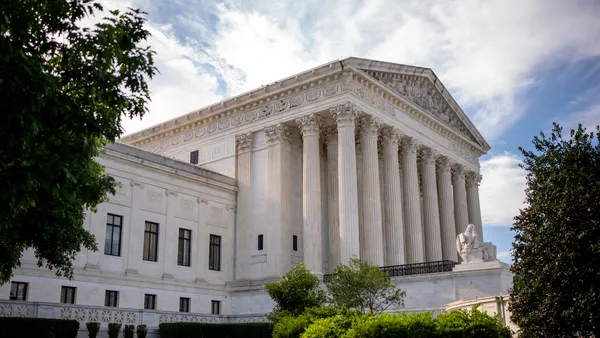Dive Brief:
- The Maryland Department of Health’s Thomas B. Finan Center, a multipurpose psychiatric facility, agreed to pay a total of $270,000 to four female recreation therapists to settle an equal pay lawsuit brought by the U.S. Equal Employment Opportunity Commission, EEOC announced Dec 3.
- Per the amended complaint in EEOC v. Thomas B. Finan Center, the center allegedly hired a less experienced male for a subordinate therapist position and paid him a higher salary than the female therapists – allegedly to give him an advantage, as a male, to salary guidelines based on prior salary. It then promoted him three times in 13 months to positions for which he allegedly wasn’t qualified and continued to pay him more than the female therapists, who had more tenure and at one point supervised him.
- After the center allegedly ignored the female therapists’ requests to equalize their pay, EEOC sued it for violating the Equal Pay Act. Pursuant to a consent decree, the $270,000 includes damages and back pay for the women. Also, for the decree’s two-year duration, the center must schedule at least two hours of training for any HR staff and other employees involved with setting employee salaries.
Dive Insight:
Under the Equal Pay Act, men and women must be given equal pay for equal work in the same workplace. Importantly, this doesn’t mean the work has to be identical, the EEOC explains in guidance.
Instead, the EPA requires employers to pay equal wages to men and women at the same establishment who perform jobs that require “substantially equal skill, effort and responsibility, and that are performed under similar working conditions,” the guidance states.
Additionally, to correct a pay differential, employers must increase the pay of the lower paid employee, not reduce the higher-paid employee’s salary, according to the guidance.
The statute does allow for differences in pay based on seniority, merit, quantity or quality of production, or a factor other than sex. But the employer has the burden of proving such factors apply, the EEOC says.
Recent EEOC settlements may shed light on how EPA issues arise. In November 2022, for example, Baltimore-based Jerry’s Chevrolet and its affiliate, Jerry’s Motor Cars, agreed to pay $62,000 to resolve an EEOC lawsuit alleging they paid a female warehouse dispatcher less than a male warehouse dispatcher for comparable work and then fired her after she complained.
According to the complaint, the female dispatcher discovered her male counterpart was making almost $800 more per month. The dealerships also allegedly paid him, but not her, a monthly bonus, EEOC said.
In addition, the dealerships allegedly retaliated against the female dispatcher in violation of Title VII of the Civil Right Act of 1964 when they terminated her a week after she complained to HR about unequal pay, EEOC asserted, although the dealerships argued that she was fired for inappropriate behavior.
“More than 60 years after the Equal Pay Act, it is not only illegal but unacceptable to treat men and women differently when negotiating and setting pay,” an EEOC district director noted in a June 2023 settlement.
In that case, a Wisconsin school district agreed to pay $450,000 to settle EEOC allegations that it paid nine female special ed teachers and one female school psychologist less than more-recently hired male employees for the same work. The women also allegedly had comparable or greater experience than male colleagues.
In the Finan Center case, EEOC alleged that the male therapist was promoted faster than the females to unposted positions to secure higher pay and was given a lighter case load.
The case also cautions employers about how they use salary guidelines: To the extent the pay inequity was mandated by state salary guidelines — which “rely solely on prior salary with no available redress for the female [therapists], thus mandating unequal pay for equal work” — the center violated the EPA when it applied these guidelines to the therapists’ salaries, EEOC alleged.












